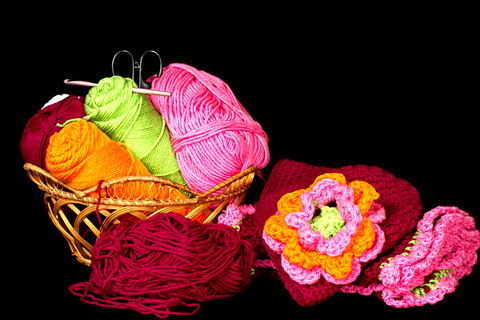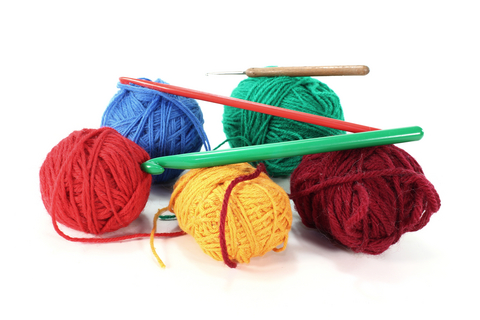 Different projects call for different yarn, sometimes you will want a specific fiber, weight, or blend. Other projects aren’t very reliant on the fiber content you use, focusing instead on the weight of the yarn and vice versa. Price also becomes a big factor for many people searching for the perfect yarn for crochet. Most people can’t afford to pay an arm and a leg for high class yarn, but they don’t want an itchy, low quality yarn that pills too easily, and just doesn’t stand up to the test of time. Fortunately, with crochet, it’s a little easier to cut some corners than it is in knitting. Crochet produces a stiffer fabric, and the drape and overall feel of the finished project becomes a little less important than in knitting.
Different projects call for different yarn, sometimes you will want a specific fiber, weight, or blend. Other projects aren’t very reliant on the fiber content you use, focusing instead on the weight of the yarn and vice versa. Price also becomes a big factor for many people searching for the perfect yarn for crochet. Most people can’t afford to pay an arm and a leg for high class yarn, but they don’t want an itchy, low quality yarn that pills too easily, and just doesn’t stand up to the test of time. Fortunately, with crochet, it’s a little easier to cut some corners than it is in knitting. Crochet produces a stiffer fabric, and the drape and overall feel of the finished project becomes a little less important than in knitting.
Picking the right kind of yarn for crochet also depends on what kind of project you’re doing. A winter hat pattern might simply call for a worsted weight yarn, but you don’t want to use cotton as it doesn’t retain heat like wool can. (Unless you’re looking for a winter hat with a draft.) When crafting an amigurumi creature, you probably don’t want to be using your expensive wool, especially if that creation is going to see lots of love from little hands. You wouldn’t use sock yarn to whip up a crocheted doily, which instead calls for crochet thread. Of course, a lot of picking out the precise yarn for crochet comes down to personal preference.
If you’re a beginner then it’s really not necessary to go out and collect all the wonderful fibers you’ve heard so much about. You’ll have plenty of time later to line your shelves, (and closet, under the bed, and other secret yarn stash spots) with alpaca, merino, and silk. It’s recommended for a lot of beginners to start out with two fibers that remain very popular amongst crochet enthusiasts – cotton, and acrylic. If you’re a knitter, who’s decided to add crochet to your repertoire of skills, you probably think the last sentence is pure blasphemy, but many crocheters end up sticking by their tried and true acrylic yarn for crochet. If you find yourself doing a lot of amigurumi crafting, you’ll probably find yourself buying lots of cotton and acrylic. They wash easily, and keep the shape they’re intended to hold.
You can purchase yarn for crochet anywhere you purchase yarn for knitting, or loom work. Don’t forget that a trip to your local thrift store can sometimes yield very favorable results – you can find balls of yarn, or a now unloved cashmere sweater that can be unraveled, given a bath and be on a needle or hook in no time at all, all for pennies.
Below are listed some popular online shops that people who crochet usually visit, and return to find the perfect yarn for crochet:
Lion Brand: Lion Brand is a tried and true company for yarns and accessories for any fiber related craft. Their treated acrylics are perfect for the crocheter who is looking for a soft, wearable yarn that will do well in the washer and out. Lion Brand also introduced their new line of “Bonbons.” These sets of six coordinating colors of acrylic and cotton yarns are perfect for the crafter looking to make small projects, like amigurumi.
Caron’s International Yarn: Caron’s has many yarn lines that are much beloved among crocheters, especially their Caron’s Simply Soft line. These yarns work up beautifully and wear very well. To sweeten the deal, Caron’s is a very affordable yarn manufacturer that is available in many countries.
Red Heart: Red Heart yarns are the yarns that many lifelong fiber enthusiasts were started out with at a young age. Their acrylic yarns are highly affordable, and they sell a wide range of crochet threads for lace and doily work. You can also find their higher end yarn, Boutique Unforgettable, which is still acrylic, but works up more like wool roving.
Picking the right crochet yarn is a lot easier than it seems. Make sure you keep an eye for the correct weights, and especially the yardage called for – there’s little worse than running out of yarn when you’re so close to the finish line of your project. If you have a family member that is also a fiber enthusiast, ask them what their favorite brands are, and why. Shop around, give sample yarn a chance, and develop your own preference when it comes to your favorite yarn for crochet.






